Azerbaijan and its ally, Turkey, have blockaded Artsakh (also known as Nagorno-Karabakh), an Armenian republic in the South Caucasus, since December 12, 2022, in an attempt to force the Armenians to flee their native lands and take over the region. Currently, food supplies are completely cut off from transportation into Artsakh, and there is no fuel or gas. The Azeri military attacks on farmers are ongoing. And the 7-month siege of Artsakh Republic is killing children.
Artsakh has for millennia been an integral part of historic Armenia and has never been a part of independent Azerbaijan. Dating back to the 9-6th century BC, the region was governed by various Armenian kingdoms, and in the 17th Century, it was annexed by the Russian Empire. In 1921, Soviet dictator Joseph Stalin arbitrarily carved out Artsakh and placed it under the administration of the Azerbaijan Soviet Socialist Republic as an autonomous oblast. Artsakh, however, remained demographically Armenian and preserved its autonomous status despite widespread oppression and discrimination at the hands of Soviet Azerbaijan. On December 10, 1991, Artsakh declared independence as a republic from the Soviet Union – an act which further increased Azerbaijan’s persecution of Artsakh. And this persecution that aims to ethnically cleanse Armenians has reached its culmination in recent years.
On July 8, in Aghabekalanj village in Artsakh’s Martakert region, three-year-old Leo and six-year-old Gita died of heat and exhaustion in an abandoned car after going to look for their mom, who had gone on foot to search for something to feed them.
Artsakh officials have been warning that supplies of basic goods are dwindling after Azerbaijan closed the Berdzor (Lachin) Corridor to humanitarian shipments on June 15. Azerbaijan’s illegal blockade has since reached a critical point.
During the initial months of the blockade, the International Committee of the Red Cross (ICRC) and Russian peacekeeping forces were able to deliver humanitarian cargo, including food and medicine, from Armenia to Artsakh.
In recent months, however, Azerbaijan has been taking additional illegal steps to double down on the blockade and finalize its genocide against Armenians. On April 23, Azerbaijan illegally established a military checkpoint on the Berdzor Corridor on the Hakari River Bridge.
On July 11, Azerbaijan announced that it would deny the ICRC access to Artsakh through the Corridor after claiming they were used to “smuggle” mobile phones, cigarettes, and fuel into the region.
This decision makes the illegal blockade absolute as the Berdzor corridor is the only path Armenians in the Artsakh region have with the outside world. This means that if somebody gets sick in Artsakh and needs to be transported out, they will die.
Artak Beglaryan, an advisor to State Minister of Artsakh, reported on July 11:
“Azerbaijan just announced that again forbids the movement of the ICRC through Lachin Corridor to transfer patients and medications. The new pretext is alleged transfers of some small number of non-medical products by ICRC drivers. Now Artsakh is under full siege with 0 [zero] movement.”
The ICRC issued the following statement about the Azeri allegations:
“Our work along the Lachin corridor is always strictly humanitarian. This essential work, which has allowed more than 600 patients to be evacuated for medical care and for medical supplies, food, baby formula and other essentials to reach healthcare facilities and families, must be allowed to continue. This work is always done with the agreement of the sides and makes a difference to the lives of thousands of people.”
Azerbaijan is creating a humanitarian crisis in Artsakh through a state-sponsored campaign to eliminate the region’s indigenous Armenian population who does not want to be persecuted by Azerbaijan and requests its right to self-determination. The greatest victims of this ongoing siege are 30,000 children, who live in Artsakh.
Dr. Anzhela Mnatsakanyan, a lecturer at the Chair of Political Science of Yerevan State University, and a researcher at the Edinburgh Peace Institute, told Providence:
“Even though we might think that the children are too small to understand what is going on, the reality is different. Children see their parents stressed; there is little food, and some can’t attend school and kindergartens. I can give an example of my friend trying to explain to her five-year-old granddaughter that she can’t take a bath as there was no hot water back in March. Her granddaughter answered, ‘But you used to have heating.’ Try explaining to a five-year-old that she cannot have ice cream as usual because there is no cream in the whole republic. My other friend hasn’t seen her nephew since December, and they were quite close; it is hard for her to explain to him why she is not visiting and missed his birthday.
“Another friend shared a video of her child playing with her friends. During the play, she said to her friends, ‘You look pale; you need to eat fruit,’ and then complained that there was no fruit in their home as well.
“Let’s remember how scared the children from Artsakh who went to Armenia to participate in the Junior Eurovision Contest were, and then they couldn’t come back home due to the siege. When they eventually had a chance to return, they were physically attacked by Azeri eco-activists and some even lost consciousness.
“A few days ago, a tragedy happened. Two children died because there was no food and fuel, so their mother went to another city on foot to find food. Please remember this is happening in 2023…
“This ongoing nightmare is not only affecting children’s mental and physical health, but is also killing children, even those who were not born yet; I know women who miscarried their children because of stress and the lack of vitamins.”
On his Twitter account, Arman Tatoyan, the former Human Rights Defender of the Republic of Armenia, listed additional facts regarding the Azeri ethnic cleansing in Artsakh.
Tatoyan noted that since January 9 there has been no electricity in Artsakh. Since March 21, no gas and no humanitarian aid (including food) since June 15. There has only been limited medications through the ICRC since June 25. Tatoyan added that Azeri-sponsored hatred and the total blockade of Artsakh with 120,000 Armenians is ongoing.
Narine Karapetian, a mother living in Artsakh, told Providence:
“Fuel shortages and limited transportation make it impossible for children to attend sports and art classes that are far from home. Unfortunately, it has become commonplace for children to be constantly exposed to life-threatening situations. Even when they hear a loud clap of thunder, they stare at us with a puzzled look, expecting us to say, ‘We have to go down to the basement.’
“Children genuinely find happiness when there is light in the house. They often wonder why their peers can travel outside of Artsakh and have new life experiences, especially during the summer, while they cannot.”
Lilit Hovakimyan, a teacher in Artsakh, told Providence:
“From a teacher’s perspective, it is incredibly challenging to educate children in Artsakh about basic human rights and fundamental freedoms when the international community seems to turn a blind eye to the violations happening in their region. As educators, we strive to instill in our students a sense of justice, equality, and the importance of standing up for their rights. However, the ongoing blockade of Artsakh creates an environment of frustration and helplessness.”
Siranush Sargsyan, a journalist based in Stepanakert, the capital of Artsakh, shared with Providence:
“The blockade imposed by Azerbaijan affects everyone in Artsakh, but perhaps children suffer the most. I experienced my childhood during the first Artsakh war [1988-1994] and its consequences have always followed me throughout life. I don’t know if it’s harder for children who are newly born, whose rights are already violated, or for children who already understand what is happening. For small kids, their mothers struggle to find diapers, formula, and other necessities. For kids who understand, they will remember all these hardships throughout their whole lives. Even their games are impacted by the blockade.
“I remember a friend’s child playing with toy cars. He lined them up and just watched. When his mother asked why he wasn’t playing, he answered that he was playing – he was waiting with his car in line to get fuel. Some children don’t understand why they can’t eat what they want or why Santa didn’t bring them gifts or why they can’t celebrate their birthdays. Another cruel fact is that children living near the border are under the constant threat of fire; they can hear gunfire from Azerbaijani positions every day and live in fear.
“The sad part of all this is that even if the problems are solved tomorrow, which I find hard to believe, these children will always remember these hardships.”
Mariam Gasparyan, a psychologist living in Artsakh, agrees with Sargsyan’s observations:
“Firstly, children feel the situation as much as the parents, since the safety for the children depends on the safety of the parent. The reaction of parents develops the reaction of the child to the situation. Kids are facing very directly the situation – skipping school due to the blockade and being deprived of their favorite foods. If the parents can’t manage their reactions correctly, then the kids do not react well. But we are in a situation that is out of our control. If the parent has certain needs and she/ he does not know how to meet them, then they cannot help their child feel secure. The longer the blockade lasts, the more one must passively adapt to it, but at the same time the adaptation mechanisms start to weaken.
“Today, the play of the children has changed. In their activities, they are more often imitating blocked roads, the absence of some food and the guards driving nearer. On one hand it is good that the kids are expressing their feelings through games, but on the other hand the situation is so tense and serious that the kids lose carelessness, and they start to combat the situation together with each other, but the levels of perception are very different. As opposed to an adult, when the kids hear that they [Azeris] will come and kill us, they perceive it directly while adults can analyze and think of other options. This brings panic attacks to children who perceive what they hear directly.
“The child’s feelings are exacerbated and when the situation is stressed, and their fathers go to the frontline, they have increased anxiety, concerns that they will never see their fathers again, they may have frustration and psychosomatic symptoms. When the parents take the child to the psychologist since they cannot do anything about the symptoms. And it is not happening once or twice, but it is constant, resulting in apathy or some elements of disorder, which needs therapeutic treatment. Especially when the kid loses a parent in recent events, their roles change. The child assumes the role of an adult and not of someone playing soccer in the yard, so they understand what they are losing. Childlike things are no longer in the focus of their life.
“The kids need to regain their carelessness, with no feelings of danger, they should be able to believe once again that their parents will be able to protect them.”
Meanwhile, 28 non-governmental organizations from Artsakh published an open letter to the international community on July 10. They said, in part:
“Artsakh is not a ‘territory’ inherited by someone by the right of the strong, but our Homeland, where we have a full and inalienable right to a safe life. Artsakh is not just a handful of 120,000 people, not counting about 30,000 forcibly displaced Artsakh residents, who were expelled from their homes as a result of Azerbaijan’s military aggression in 2020…
“We suggest recalling the history of the Second World War and trying to imagine: would it have been possible to call on Jews to live under Hitler’s Nazi government? Modern Azerbaijan is also a Nazi state in relation to the Armenians, and it is not difficult to make sure of that – in case of an objective look at this issue without unilateral consumption of the Azerbaijani propaganda. Having survived the horrors of the three wars unleashed by Azerbaijan, pogroms, exile, psychological terror, human and material losses, continuing to live with the looming existential threat, the people of Artsakh are demanding to use all existing international mechanisms to prevent ethnic cleansing and genocide carried out by Azerbaijan. In view of the current situation, we demand the presence of representatives of all relevant international organizations in Artsakh.”
Will the world hear this call? Azerbaijan’s illegal blockade on Artsakh has remained ongoing for the past 7 months. Will the US administration finally take a moral step at this historic time and end the second Armenian genocide in Artsakh?
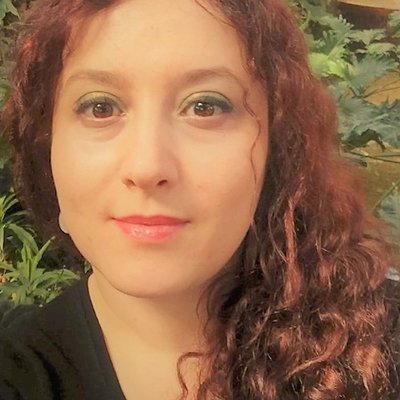

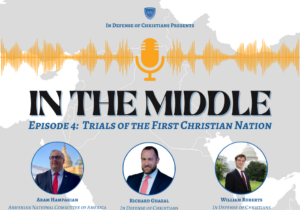
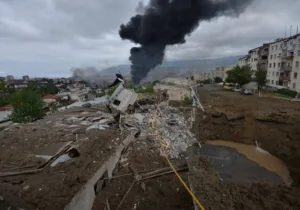
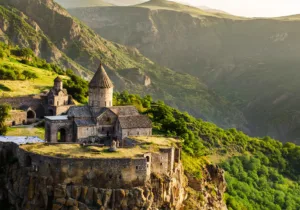
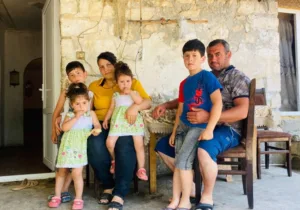

 Sponsor a student for Christianity & National Security 2024
Sponsor a student for Christianity & National Security 2024